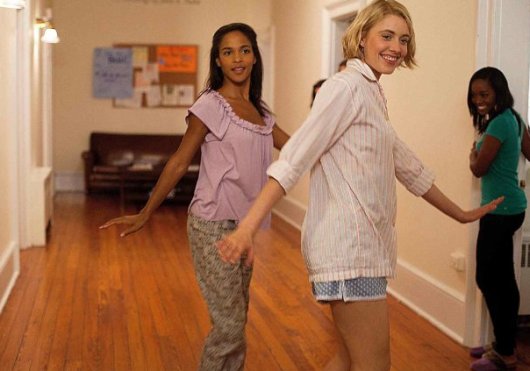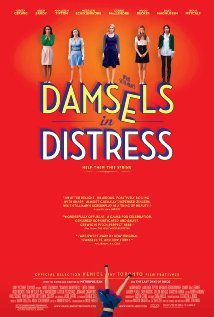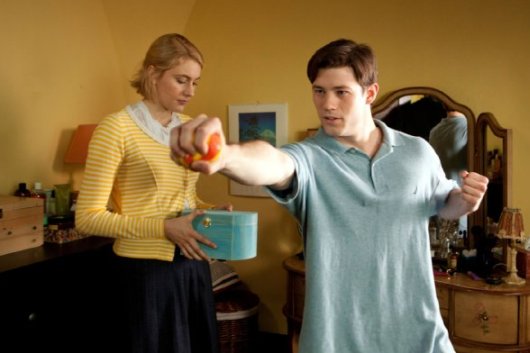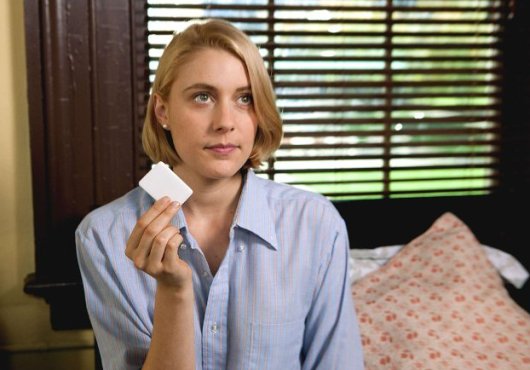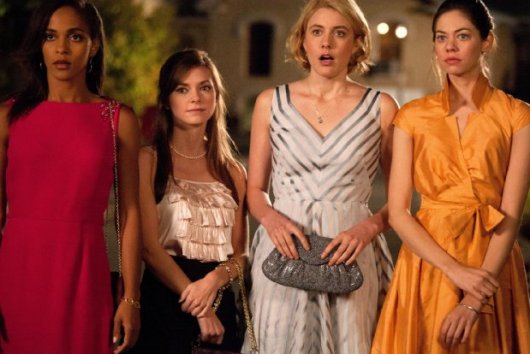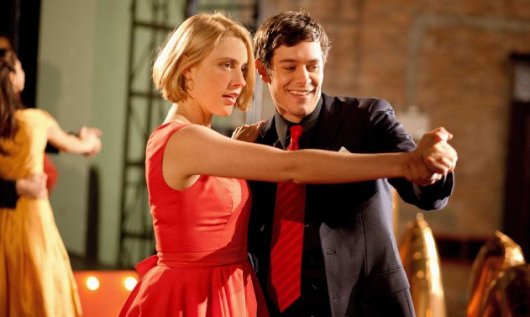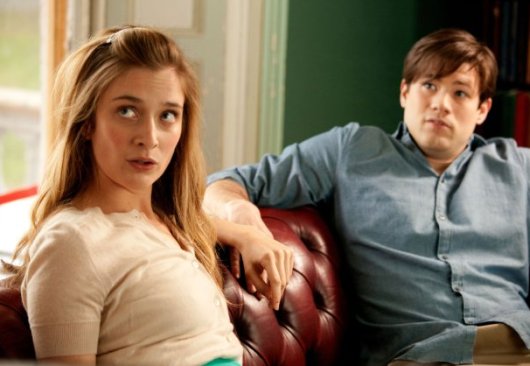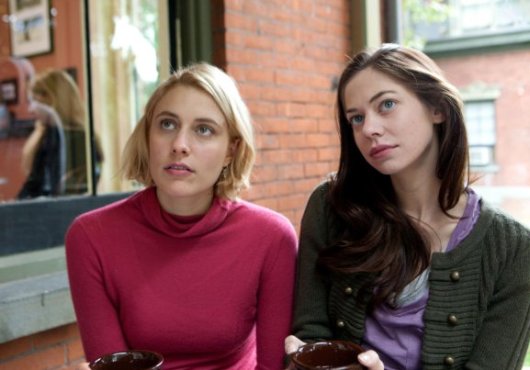 FILM
FILM In Which We Would Like To See You Again
 Thursday, December 7, 2017 at 8:00AM
Thursday, December 7, 2017 at 8:00AM 
Christine's Piety
by BOBBY VOGEL
Lady Bird
dir. Greta Gerwig
93 minutes
 Lady Bird is a phenomenon now, but it is still hard to be prepared for this film. We are simply not conditioned by current cinema to notice what it notices: the way an awkward young woman falls back on words like “cool” and “awesome,” not because she is inarticulate, but because she is nervous and confused and in love; or the way she suddenly feels desired when a young man says he’d like to see her again; or the way her voice deepens and grows in confidence when she responds to him.
Lady Bird is a phenomenon now, but it is still hard to be prepared for this film. We are simply not conditioned by current cinema to notice what it notices: the way an awkward young woman falls back on words like “cool” and “awesome,” not because she is inarticulate, but because she is nervous and confused and in love; or the way she suddenly feels desired when a young man says he’d like to see her again; or the way her voice deepens and grows in confidence when she responds to him.
Or the way when sitting in a group and something astonishing happens, and you hear others reacting, you might immediately look not at the event but at your best friend’s face, to see her reaction. Or the faintly attracted, disinterested way you notice a handsome new boy when you already have a boyfriend. Or how, when stuck in a car with friends who are bad to you, at the very moment you realize it, you muster the nerve to get out by sneaking proud glances at yourself in the rear-view mirror.
This is the stuff of clichés, but there are no clichés in this coming-of-age film. It proceeds in vignettes. What feels clichéd in a single scene is every time redeemed by a detail that would be missed by one who is critical of clichés. The film avoids them not by daring to be different but by daring to be similar. It seeks common ground, that is, between itself and its audience. It trusts its audience to trust it, which is a radical thing to do in a time of inhuman cinema, destructive of the qualities needed for that trust. A pervasive inhumanity can only prepare us for alternating evils: give in to the false pleasures and manipulations of Hollywood, or be made mistrustful and cynical, be made to always be on the lookout for clichés. Those of us who have chosen the second option out of necessity are challenged by this film. Lady Bird rejects this problem and suggests itself as a third way.
It is, then, truly an ambitious film. Its director-writer, Greta Gerwig, positions herself as a wise woman, as a filmmaker that the defiant and radiant Christine “Lady Bird” McPherson (Saoirse Ronan) could have learned from. A character who renames herself is not the kind of person who would listen to just anybody. Gerwig understands the way Christine smiles at New York City the first time she sees it, emerging out of the stairs from the subway as if she had lived her whole life underground until then. But Gerwig also understands how the excitement of a new home won’t make you happy if you’re running away from an old one.

She understands how Christine might, on one random Sunday away from home, almost inexplicably, walk into a church service and listen to the music. She also understands why she might only watch from the balcony, or not stay for very long, but be moved nonetheless, and walk away with new hope and a little more self-understanding. Gerwig’s religious scenes are like Eric Rohmer's in their almost muted piety and in their full confidence in that quietness. Gerwig knows that piety is a powerful thing and need never be loud. She also knows that piety can be ridiculous, inflamed, or very disagreeable, and that it might especially seem so to someone like Christine.
Lady Bird is a love letter to its characters, and to those watching who might also love its characters, and learn from that love modeled by the director. But love letters sometimes never rise above platitude; they sometimes lack the tension of stinging self-awareness. It can be the mark of both a cynic and a mature man to be skeptical of love letters. The cynic doesn’t want to feel his feelings. The mature man wants to feel them thoughtfully and in proportion. He wants to feel them in a way that leads to a deeper understanding; he wants to leave room for his reason. The immature person might want to obliterate his reason; he might want to feel his feelings too much, or linger in his memories for too long. Lady Bird proceeds in vignettes because we remember our lives in vignettes. One feels that Lady Bird the character is remembering her youth as an adult via Lady Bird the film. This is an accomplishment by the director. It is not a crutch of autobiography, but an invitation to remember with her.

Still, one worries that Christine lingers too long in her memories. Understanding the film as a succession of memories illuminates at the same time as it disturbs us in its overwhelming affection for them. Christine seems to be unusually invested in and attached to her adolescence, or rather, to its very end. The cusp of adulthood is brilliantly remembered and depicted, but perhaps overly loved.

That heightened love has the tendency to hide or impoverish Christine’s inner life, especially its darker moments of guilt or regret. It is conceivable that our decent director does not find “guilt” to be helpful, or has not reflected that reflecting on guilt can change the quality of that guilt, from something that haunts you to something that saves you. One scene shows a young man, guilty of hiding a secret from his unaccepting family, suddenly sob. Guilt, here, is portrayed as something to overcome or escape from, and secrets are shown to be special, inviolable, and at the core of one’s identity.
Other scenes recommend the notion that privacy, secrecy, and safety make up the sanctuary where one can become who one is. The family bathroom, door locked, is the only place Christine can be her true self. The film obscures the interplay between public and private in which one contemplates, in private, what one has done and said in public, and what one will or will not do in the future. Thoughtful, public action implies private thinking. Otherwise solitude is self-absorption.

It is a mark of Lady Bird’s realism that this complaint may be read as description. Unbearable family life destroys the dynamic between public and private. When the family-authority cannot maintain its power without belittlement or manipulation (not unlike how Hollywood works), then the private becomes a shelter from that authority. One escapes from the public to the private. The private becomes a place to contemplate, not reality, but fantasy. This is why teenagers like Christine might decorate their bedrooms. It is healthy for young people to fantasize or decorate their future selves. But they should imagine becoming someone they could admire and respect after hard work and experience. Christine wants to become someone now, without sweat and without failure. Early in the film, she admires a favorite song because it was “written in 10 minutes.”
We shouldn’t expect Christine to grow up immediately. But we should expect it, hypothetically, in five or ten years, if we are to expect adulthood from the film itself. Lady Bird sometimes seems to assume that identity comes easily, that conflict can be solved by sentiment or a phone call, or even that watching TV news is political engagement. Christine follows the American wars overseas, but she never talks about them, just as she never really talks about who she wants to be outside of the near future. The gist of her voiced introspection is that she wishes her house had a dedicated “TV room.” It is perhaps the saddest remark in the film, full of hope yet on the verge of stasis.
Bobby Vogel is a contributor to This Recording. This is his first appearance in these pages. He is a writer living in Texas. You can find more of his writing here and here. You can e-mail him at bobbyvogelfilm@gmail.com.

 bobby vogel,
bobby vogel,  greta gerwig
greta gerwig 




































